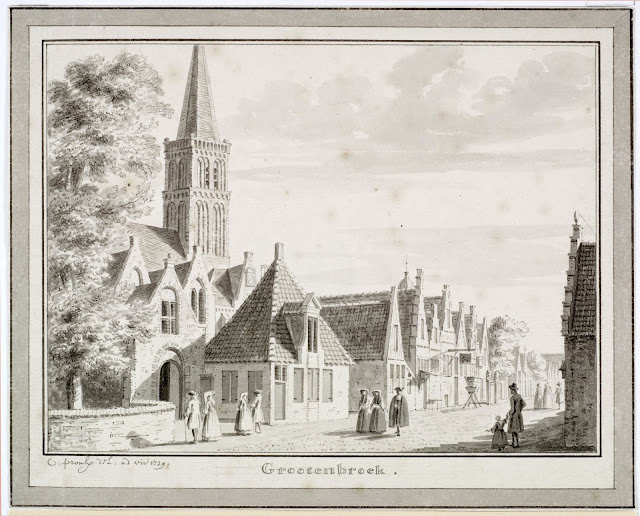 |
| Postcard sent from Grootebroek to Amsterdam. 25th of November 1877. |
Last week I found this postcard in a large box of similar items at the Brievenbeurs in Gouda. I bought it out of regional interest, since the postcard was sent from the village of Grootebroek (5 km east of the town of Hoogkarspel where I live). Although the item was severed on arrival (pinhole in the middle) I still think it makes a valuable addition to my regional collection of Westfrisian postal history.
Wrong postal procedure?
Although my attention was immediately triggered by the name marker of Grootebroek, I took me until today to discover a peculiarity. It seems as if this postcard travelled a rather unusual route, because items from Grootebroek should have been cancelled at the post office in Enkhuizen and not in Hoorn as we see here. So what happened? |
| Map of southern West Frisia with Grootebroek below the red arrow, Enkhuizen to the east and the city of Hoorn in the bottom left corner. |
As will be clear from the map above, Grootebroek lies much closer to Enkhuizen than Hoorn and the Grootebroek sub post office would therefore have operated under the postal district of Enkhuizen. There could be two reasons I can think of why we find the Hoorn CDS instead:
- Difference between the handling of letters and postcards. Stamps on letters from sub post offices should have been invalidated by a 'Puntstempel' (numeral) of its corresponding district. Maybe these rules didn't apply to postal stationary and postcards, thus allowing an item to cross the main post office's district border without been cancelled there?
- The geographical location of Enkhuizen made it probably very tempting to send items directly to Hoorn as the postal service would have travelled through the villages of Bovenkarspel, Grootebroek etc. anyway. Why bother sending the items to Enkhuizen when there was no need to? It probably seemed as ridiculous to do then as I think of it now.
 |
| The village of Grootebroek before the opening of the railway Hoorn-Enkhuizen in 1885. |
The last argument seems even stronger when we observe that there didn't exist a railway between Enkhuizen and Hoorn until 1885. The only possible routes to Hoorn from Enkhuizen could either be travelled by boat or by diligence which used the 'Straatweg' (paved road) through Bovenkarspel, Grootebroek, Lutjebroek, Hoogkarspel, Westwoud and Blokker. From Hoorn onwards our postcard used the canalboat or ferry in order to reach Amsterdam: this took about 6 hours.



